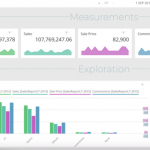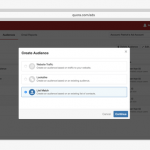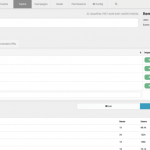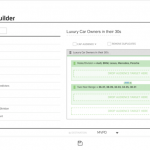As The AI War Rages, Google Assistant Is “Very, Very Likely” Coming To Nest’s New Secure System
When Nest introduced a new home security system called Nest Secure at a press event this week, there was one glaring omission from the announcement: An explanation of how natural-language AI created by Nest’s Alphabet sibling Google would eventually control all of it.
Back in May, at Google’s I/O conference, CEO Sundar Pichai said that, “we are rethinking all our products and applying machine learning and AI to solve user problems. And we are doing this across every one of our products.” But only at the end of Nest’s launch event on Wednesday did cofounder Matt Rogers announce that Google’s Assistant will soon be available inside one of his company’s existing products, the Nest Cam IQ Indoor.
When I asked why the Assistant wasn’t already available in all the new home security products, Rogers laughed and said the addition of the Assistant to more devices is “very, very, likely” coming soon–including to the Nest Guard, the company’s new in-home controller for Nest products.
“You want to be able to interact with the system in every way possible,” Rogers said. Speaking to the Assistant through a Nest device, then, would join the Guard keypad and the Nest app as ways of doing that.

“So the Assistant might send you a notification while you’re on the way to work saying, ‘We saw you were the last one to leave the house; would you like to arm the system?,’” Rogers explains. Then the user could simply reply “Yes” and the Assistant would arm the system.
Apple’s Siri, Amazon’s Alexa, and Google’s Assistant all sit at the middle of growing connected home ecosystems that are competing to become the operating systems of our lives. That’s why, in connected home platforms and products, it’s becoming table stakes for companies to provide a natural language assistant to hear spoken commands to turn off lights or lower the heat. Users often don’t want to have to physically interact with devices and apps to make them work.
Consumers will expect the same thing from home security systems. This isn’t news to Rogers. But the Assistant would bring more than just voice recognition and natural language technology to the Nest ecosystem. It would also use machine learning developed by Google to understand each Nest user’s habits and make helpful suggestions. And it’s that deep Google AI that might give Nest products an edge over other home security systems.
I also asked Rogers if Nest’s products would soon be integrated with the Google Home natural language smart speaker. He didn’t say whether that was on the near-term roadmap, instead explaining that Assistant can be built into existing Nest products so that users can talk to their security devices in the same way they talk to Google Home. Rogers said it’s likely that two additional microphones will be added to the Nest Guard device to make it better able to hear and understand the voices of people in the room. This makes sense because the Nest Guard is designed to sit near the front door, waiting to be armed or disarmed by people leaving or returning home. Moreover, your entryway might not be an ideal place for a Home device.
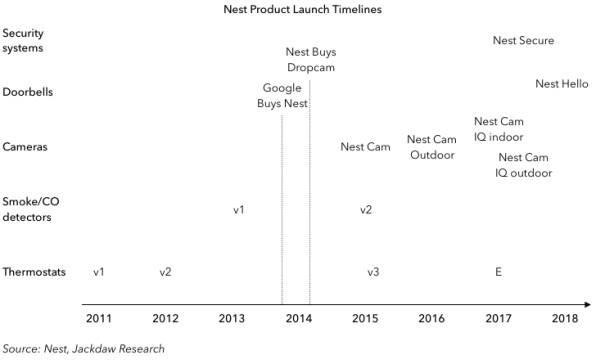
Nest was acquired by Google three and a half years ago in 2014, and acquired the home camera company Dropcam shortly after. But from 2014 to 2016 its product lineup of smart thermostats, indoor cameras, and smoke/CO2 detectors didn’t change. Nest was slow to release wholly new products, and slow to capitalize on Google’s AI brain trust.
That began to change over the past year when Nest engineers began working closely with their Google counterparts to build Google’s computer vision AI into Nest cameras. It started with person recognition (distinguishing a human from a dog or a tree), and has progressed to facial recognition (matching faces in front of the camera with profiles of faces it’s seen before, like the postman). The person recogition is part of the free tier of service bundled with Nest Cam IQ units; face recognition requires that you subscribe to the extra-cost Nest Aware service.
“All of this came after the ouster of founder Tony Fadell,” writes Jackdaw Research analyst Jan Dawson in a recent research note, “and although that’s likely in part a coincidence, it’s notable how much more quickly the company has appeared to be moving in the past year.”
Another explanation for why it’s taken a while for Nest to intermingle Google technologies into its devices is sensitivity over the possibility of Nest sending the data it collects in homes back to Google for purposes such as ad targeting–a scenario that people began worrying about the moment the acquisition was announced in 2014. It remains enough of a concern that the company has underlined the fact that its use of Google machine-vision technology does not involve it sharing the face matches it makes with Google.
Taking On ADT
A whole industry of companies, such as ADT and Vivint, provide a combination of professionally installed hardware and subscription monitoring services. Nest is now offering both parts, only the hardware part is do-it-yourself. Its $499 Nest Secure kit consists of a central brain device (Nest Guard), a couple of window/door sensors that also do motion detection, and a couple of Nest Tabs–half-dollar-sized keychain devices that log the user in and out of the security system.
If the system detects a human moving in the home when no one is supposed to be there, it can sound an 85-decibel siren and notifies the home owner via the app. The system might also send a notification to MONI Smart Security, a security monitoring service Nest has contracted with. MONI may then dispatch police to the home if the Nest system detects something dangerous like a break-in. Nest has not yet announced how much the MONI monitoring service will cost.
Nest isn’t the first company to try to rethink and simplify home security systems. Asked why he thinks its approach will work, Rogers told me it’s all about offering the right mix of automation and user control. “We could do everything for you, but we want to give you enough control to where you are still in the driver’s seat.”
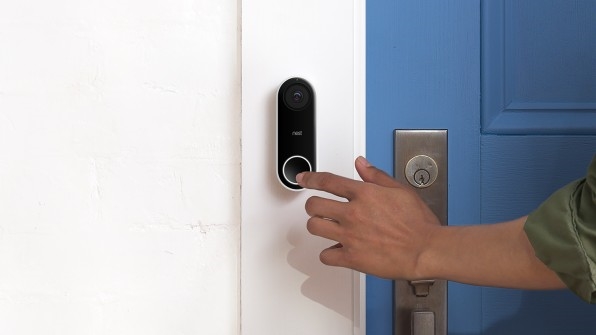
Along with the Nest Secure gear unveiling, Nest used its event to preview its first smart doorbell. Nest Hello–which will be available later this year at a price to be announced—is outfitted with a microphone, a speaker, and a high-quality camera. The camera uses AI to recognize that a person is coming up the walk, or even recognize a familiar face when the person gets close, regardless of whether they push the doorbell. If Hello recognizes the mail carrier, for example, it might notify the user through the app. Then the user can talk via the doorbell’s microphone and speaker. A user who is otherwise occupied and can’t speak can trigger a canned “just leave the package at the door” announcement.
Nest didn’t invent the doorbell cam, and will be facing stiff competition from both Ring and SkyBell. Both of those companies have products that can detect motion and suspicious activity around the doorway, take video of it, and send notifications to the user via an app. But with Hello as with its other products, Nest may hope the infusion of Google AI will empower its security technology to identify and understand threats more quickly and accurately.
Fast Company , Read Full Story
(38)



